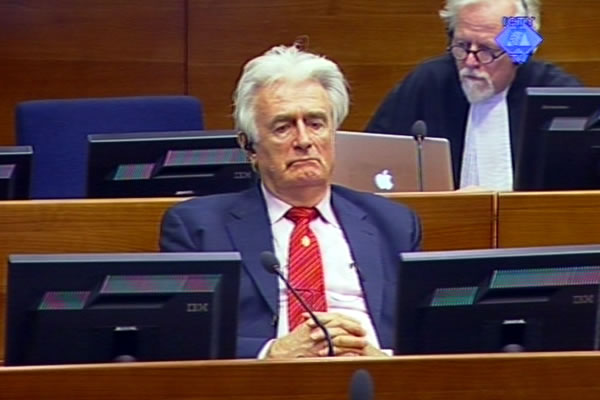Home
PROSECUTION WANTS GENOCIDE CHARGE TO BE RESTORED TO KARADZIC INDICTMENT
The prosecution has filed its appellate brief against the judgment acquitting Radovan Karadzic of genocide in several BH municipalities. Karadzic was acquitted after the prosecution rested its case. The prosecution wants the genocide charge to be restored to the indictment against former Republika Srpska president
 Radovan Karadzic in the courtroom
Radovan Karadzic in the courtroom At Radovan Karadzic’s trial, the prosecution has filed an appeal against the judgment of acquittal of charges of genocide in several BH municipalities handed down on 28 June 2012, after the prosecution rested its case. The Trial Chamber acquitted former Republika Srpska president Radovan Karadzic of charges for genocide in Bratunac, Foca, Kljuc, Prijedor, Sanski Most, Vlasenica and Zvornik. As the prosecution notes in its appellate brief, the Trial Chamber ‘took the wrong road and arrived in a wrong place’ when it concluded that there was no evidence to support the charges of genocide in the municipalities. The prosecution therefore wants the Appeals Chamber to reverse the acquittal and to restore the count of genocide in those municipalities to the indictment.
The appeal also notes that the evidence could have led a reasonable Trial Chamber to conclude that genocide was indeed perpetrated in the municipalities and that Karadzic and other members of the joint criminal enterprise participated in it with a specific genocidal intent. The prosecution argues in its brief that the judgment was delivered orally in the form of a series of conclusions which could be interpreted in various ways. The judges failed to provide a statement of reasons in writing.
There are four grounds of appeal. The first ground of appeal pertains to the Trial Chamber’s conclusion that there was no genocide. In their judgment of acquittal at the half-time of the trial, the judges found that ‘the nature, scale and context; of ‘the material elements of genocide’ – murder, serious bodily and mental harm, forcible transfer of a population and subjecting a population to destructive conditions of life leading to the annihilation of a group – didn’t reach the scale’ which would lead a reasonable trier of facts to conclude ‘beyond reasonable doubt’ that they were perpetrated with the intent to annihilate Bosnian Muslims or Croats as a whole or in part as an ethnic or religious group.
According to the prosecution, if a reasonable Trial Chamber applied correctly the Tribunal’s Rule 98 bis, it may have concluded that ‘the perpetrated acts represent genocide’. The Trial Chamber erred when it imposed additional elements for the establishment of genocide. The prosecution contends that it is not necessary to establish that crimes ‘had an impact on the existence of the group’; there is likewise no ‘numeric threshold of victims’ as a criterion for genocide.
The second and third grounds of appeal refer to the genocidal intent of the accused. In the view of the prosecution, there is substantial evidence indicating that in the months before the conflict Karadzic made threats about ‘physical destruction’, saying that Bosnian Muslims would ‘disappear’, that they would ‘be destroyed’ and ‘wiped out from the face of the Earth’. The motion notes that forces under Karadzic’s command implemented the threats in brutal actions resulting in thousands of people who were killed regardless of their status, sex or age, thousands of detainees who were held in inhuman conditions, beaten and raped, and in the systematic destruction of religious and cultural buildings to wipe out all traces of their existence.
The Trial Chamber failed to explain why it found that Karadzic’s threats didn’t reflect genocidal intent, the prosecution argued. Also, the Trial Chamber failed to establish that the accused and other members of the joint criminal enterprise shared the genocidal intent regardless of the intentions of direct perpetrators. According to the prosecution, by applying the Rule 98bis standard a reasonable Trial Chamber could conclude that acts representing elements of genocide were perpetrated with intent to ‘partially’ destroy a protected group. Instead, the judges sought to define destruction of a ‘part of the group’ as a ‘significant part’ or a ‘significant number of members of the group’. The prosecution contends that in the context of the correct application of Rule 98 bis it was premature to do so. In this case, the Trial Chamber failed to submit a proper explanation for its findings.
Finally, in the fourth ground of appeal the prosecution maintains that the Trial Chamber erred when it failed to analyze if genocidal intent was established within the framework of other modes of responsibility Karadzic was charged with, such as planning, ordering, instigating, aiding and abetting or failing to prevent crimes and punish their perpetrators.
The five-judge Appeals Chamber with US judge Theodor Meron presiding, will consider the prosecution’s appeal. The other judges are Patrick Robinson from Jamaica, Liu Daqun from China, Khalida Rachid Khan from Pakistan and Bakhtiyar Tuzmukhamedov from Russia.
Linked Reports
- Case : Karadzic
- 2012-09-24 300 HOURS NOT ENOUGH FOR KARADZIC’S DEFENSE CASE
- 2012-09-21 VICTIMS WILL NOT BE AMICI CURIAE IN KARADZIC CASE
- 2012-09-20 KARADZIC WANTS A SUBPOENA FOR CUTILEIRO
- 2012-10-03 KARADZIC WANTS GENERAL KRSTIC TO TESTIFY
- 2012-10-05 KARADZIC GRANTED LEAVE TO APPEAL
- 2012-10-11 KARADZIC GETS A BILL FROM TRIBUNAL
